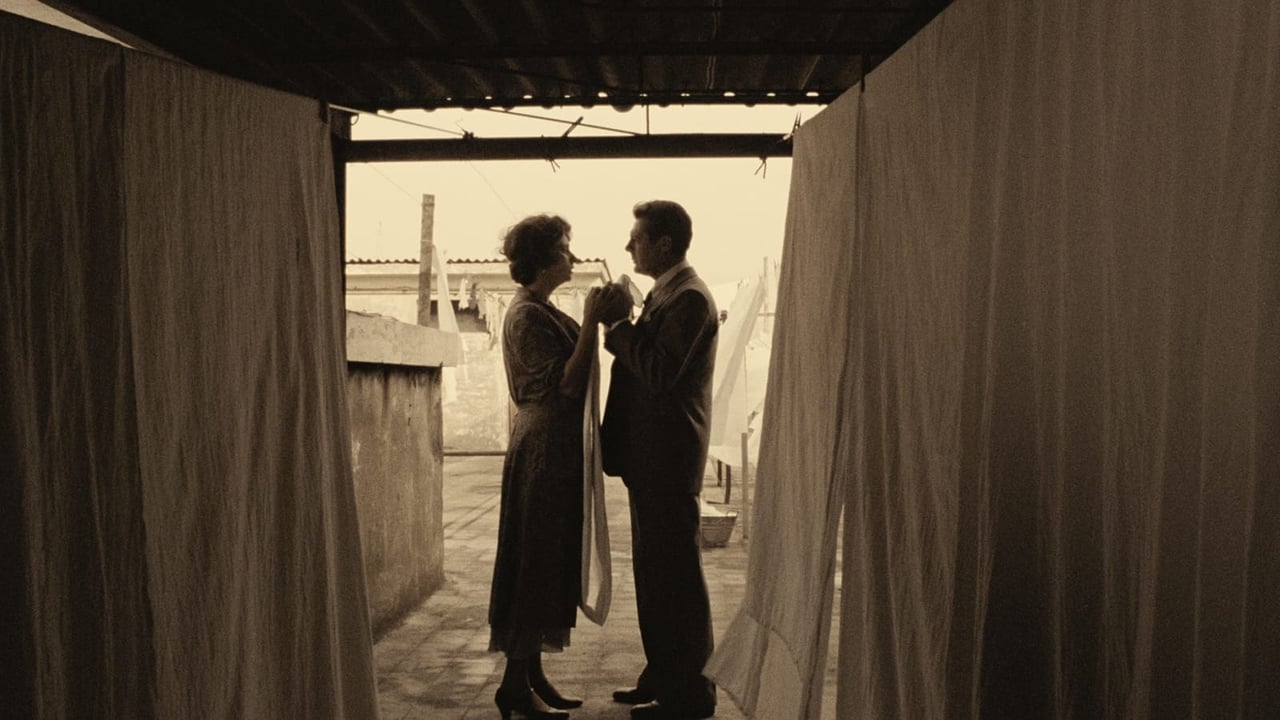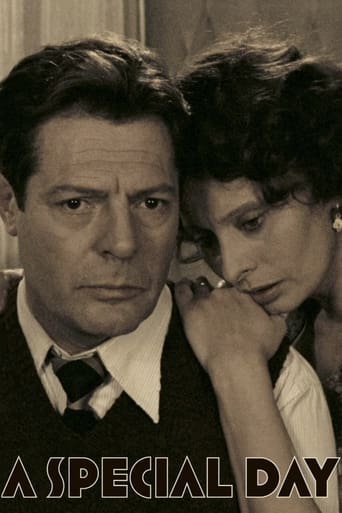

"A Special Day" is not a film for everyone. While it is very well made and the acting is terrific, it's style and subject matter make it a movie that the average person would probably not enjoy.This film is set in Rome during the first meeting between Mussolini and Hitler. The city is abuzz and fascists are excited to see the treaty between the two formidable nations. However, while this is a bit, global event, the film is very small--confined to a couple apartments nearby and involving two strangers who quickly become friends. While Antoinetta (Sophia Loren) stays home and keeps house while her husband and children attend a fascist rally, she is left alone--with little to actually do. When her pet bird escapes and flies towards another apartment, she gives chase and meets Gabriele (Marcello Mastroianni). The two hit it off--and the rest of the film consists of the two talking....and talking. Some of it is very interesting (such as when Antoinetta falls in love with Gabriele--only to learn he is gay) and much of it seems like small talk among friends. As for me, I liked it for the acting, but even with my high tolerance for this sort of film, it did get old after a while. Additionally, the film's lousy print (it appears to have either been copied from a degraded videotape or directly from TV) makes it a rather unrewarding viewing experience. Not bad--just not all enjoyable.
... View MoreI just saw this movie on a grainy DVD in a dubbed version--I believe Sophia dubbed her own English. Even so, this film blew me away . . . slowly. The near-constant background noise of radio announcers burbling on and on about the glories of fascist Italy and Nazi Germany over martial music created a sonic claustrophobia that matched the visual sense of restriction in the apartment complex. I knew beforehand that Mastroianni was cast as a gay man; I was not prepared for the delicacy and refinement he brought to his portrayal. And Loren's character was full of surprises--we first see her as an exhausted, exploited wife and mother. It's a shock to see her face light up when she recalls her encounter with Mussolini. Loren as a fascist! How these two connect in such a human, simple way is breathtaking. Each is imprisoned in their own fashion at the end, and yet there is a hint that each has found a fragile new sense of freedom. But Scola does not deny the tragedy of these characters' destinies. Very moving. I hope to see it in the original Italian some day.
... View MoreUna giornata particolare is a film which has made brilliant use of closed spaces.It is in these dull,empty spaces that the audience sees the emotional turmoil and boisterous outbursts of Ettore Scola's two leading characters.Marcello Mastroianni and Sophia Loren play two frustrated individuals who decide to come together for some brief moments of their listless lives.It is the element of sadness associated with the narrative that makes us believe that people will take sides with characters close to them.All men would really feel sorry for Sophia Loren's character.All women would surely cry their hearts out at Marcello Mastroianni's existential plight.Disguised sexualities are also one of the key issues of this somber,poignant film.Most of the characters grapple with issues related to their own sexualities.Una giornata particolare cannot be termed as a pro gay film although it has been nicely depicted that a homosexual chap mixes well with women.This is a film for which Italian director Ettore Scola has crafted a fairly good mix of fact and fiction.His idea is to show how the arrival of Hitler changed destinies of ordinary Italian folks.A word about the courageous personnage played magnificently by great Marcello Mastroianni.He acts as a real man who does not beg for pity.He happily accepts his fate and readies himself to face the worst time of his short yet meaningful life.A true masterpiece of cinema !!!
... View MoreThis film makes a strong comment about the Italian people of the time. The use of the mirrors to enhance the revelations of the characters is lovely and I can't not mention the beauty and magnificence of Sophia Loren and Mastroianni. I love them both. Their way of interacting is so beautiful and natural that you may question whether or not the camera is actually there. The husband, in his brief role, is also excellently portrayed as the fascist Italian who commands his wife and children but, in his own way, a loving father. The beginning scenes with Hitler at Piazza Venezia with all the Italians is incredible and really places the film historically. I loved the film and I also agree that it is funny it isn't more renowned.
... View More